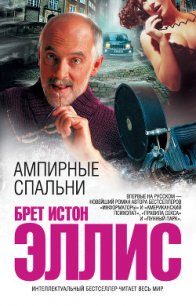Third man out - Stevenson Richard (читать хорошую книгу полностью .TXT) 📗
Restored? I said, "Do you want to stay at my place overnight? You'll be safe there, I'm certain."
"That's not really necessary. Eddie will be here and we can take turns sleeping. I think my gun was damaged in the fire, but Eddie has another one."
"Registered?"
"No. From the bodega, like mine."
"I'll try to get the Handbag cops to increase their coverage of the house. After the fire, that should be no problem."
He agreed and I phoned the Handbag police station. I reached Octavio Reed, who said, "Before we do anything at all out there, you should talk to the chief. He knows of you and he wants to meet you. Don't say anything about-you know."
"No way."
"Chief Bailey wants to see you this afternoon if you can make it. He's out right now. Can you come at two?"
"I'll be there."
"Just don't trust those two," he said, and rang off.
"I'm meeting the chief this afternoon about arranging additional protection," I told Rutka, and could see him working up to a fit over the delay, when Sandifer walked in.
"Oh, jeez, look at the porch! This is- Oh, jeez!"
"It's a mess," Rutka said.
"Are you okay?"
"Yeah, but there's a ridiculous new development that I should tell you about."
"What?"
"Vera Renfrew told the police she saw somebody suspicious go down her yard and up ours before the bomb was thrown."
Sandifer stared. "She did?"
"She said she saw you."
Sandifer's face fell forward, along with much of the rest of his upper body. "Oh, that's just great," he said finally. "Jeez, why would she say a thing like that? That's crazy."
"I guess it was somebody who looked like you," Rutka said.
After a brief, frozen instant, Sandifer said, "Oh, no, not-"
"It makes sense, doesn't it?"
"Grey Koontz."
They went on in this vein for some minutes, and I kept thinking, They had a scam worked out that went awry and now they're making it up as they go along. end user
7
The insurance agent soon showed up, trying to look delighted about shelling out a few thousand of the home office's zillions, and while he and Sandifer and Rutka surveyed the reeking and charred mess on the back porch, I went upstairs.
En route to the attic I looked into Rutka's and Sandifer's room and spotted the telephone answering machine Rutka had mentioned earlier. The message light was blinking. This had to have been the call Rutka and I had heard from the attic a few minutes before the fire broke out, and which Rutka had said not to bother with.
I pushed the playback button. There were a couple of clicks and that was it. The caller had hung up.
In the attic the sauna heat hit me again. It was hard to imagine that men paid large sums of money to join fashionable clubs so that they could sit around in places like this and perspire recreationally. I peeled off my sopping polo shirt and hung it over the front of the whirring box fan.
The file I pulled out first, on Bruno Slinger, was thicker than most. It contained press clippings on the Republican state senator Slinger worked for, and Slinger, as the senator's occasional spokesman, was quoted from time to time, always in support of conservative causes: anti-abortion, anti-social services, and, amazingly, antigay. News photos of the senator in groups often included Bruno Slinger in the background.
Slinger had an easy, smug look in his press clips, but in his other photos he was more somber. In one Polaroid his cheek was bulging with the erect member of a physically fit Caucasian male whose bare upper body was out of the shot. The member was condomless, not a good idea anymore. The notation on the back said "Slinger and G. Koontz" and gave a date from the previous fall.
Handwritten notes by Rutka paired Slinger's name with those of a dozen or so other men, with dates and locations noted, most of them motels in the Albany area. The name Grey Koontz did crop up several times. I reexamined the photo with "G. Koontz" on the back to see if the man in it resembled Sandifer, and while their builds were similar, the focus on the man's organ rather than his face made evaluation difficult. Still, it occurred to me that Rutka and Sandifer might actually be telling the truth about a Slinger-Koontz frame-up attempt.
Several handwritten letters were in the Slinger file, each in a different script. One, dated the previous October, began: "Hi, John.
Just thought you'd like to know that Bruno Slinger is a cocksucker." It was signed "A. Friend." There was no return address; the mailing envelope stapled to the letter was postmarked Albany.
Another note read: "Bruno Slinger is gay. Check it out." No signature or return address on that one either. A third, also unsigned and from Albany, informed the reader that "Bruno Slinger goes for boys." This could have meant underage youths or boys of thirty-five; the rest of the letter described in unoriginal language Sling-er's sexual practices and gave no further clue to his age preferences.
There were several similar letters offering firsthand knowledge of Bruno Slinger's homosexuality, and there were fifteen or twenty letters-often typewritten and literate-lacking evidence of personal experience but insisting on the fact of Slinger's queerness just the same. Many of these ill-wishers were especially venomous and used words such as "twisted" and "monstrous" and "evil" to describe Slinger's hypocrisy.
The Slinger file also included a note in Rutka's handwriting describing an anonymous phone threat, which Rutka speculated had come from Slinger. The caller had said, "You're going to get your balls ripped off for this one," and the call had come just a day after Slinger's outing in Cityscape.
I flipped back to the file for Ronnie Linkletter, the Channel Eight weatherman Rutka said Slinger was now involved with.
Linkletter's file was a thick one too. It contained a multicolor promotional brochure put out by Channel Eight detailing the weatherman's part in the station's "We're Hometown Folks" campaign. This was where the station's news "personalities" went out into the community and showed, a tad superfluously, that the news broadcast by Channel Eight's newscasters existed in a context not of history but of themselves. They looked happy about this, and according to the ratings, the station's viewers seemed satisfied too. Ronnie Linkletter's part in the "We're Hometown Folks" effort was to go into clubs and schools and relate odd facts of meteorology.
Linkletter also was as comfortable in front of a Polaroid as he was on the Channel Eight news set. Ronnie was belly down in his single blurry snapshot, butt raised for the insertion of a sizeable organ whose owner's face was above the frame.
Linkletter, too, had been tattled on by anonymous letter writers. One began: "Dear Mr. Rutka-I have been reading your column and agree with you one thousand percent that queer people have to rise up or die. A life of oppression is no life at all…" The writer went on to proclaim his philosophical fraternalism with Rutka and then offered the name of a "media celebrity who has not accepted his own queerness but should be made to do so because he is well-liked in the community and would further establish queer omnipresence in the public mentality." The name was Linkletter's and the writer asserted that he once spent a night with Linkletter in the Fountain of Eden Motel on Route 5.
There were other, similar letters-Linkletter attracted a more casual, less incensed type of snitch than Bruno Slinger did-and an assortment of dated notes in Rutka's handwriting describing phone calls about Linkletter. One sheet of paper labeled "From JG Linkletter at motel with A" consisted of a long list of forty or fifty dates, each of them a week apart.




